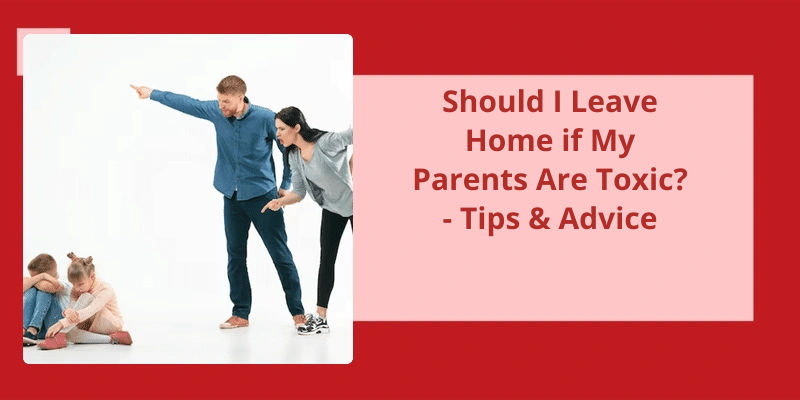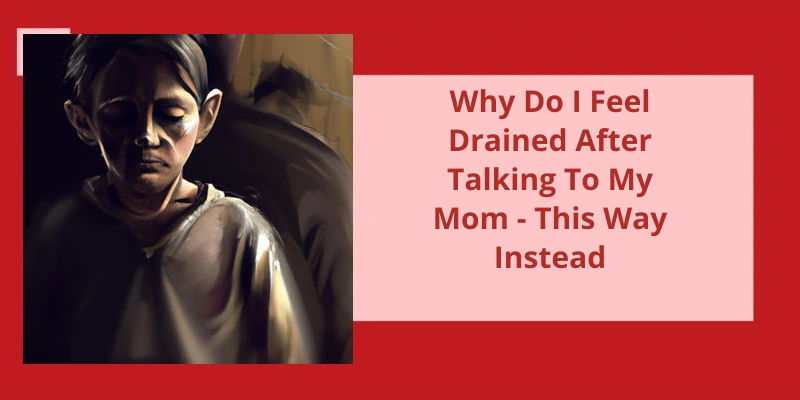Leaving home is a daunting decision for many young adults. However, sometimes it's necessary to leave for one's own well-being, especially if your parents are toxic. Children who grow up with toxic and abusive parents can suffer from emotional, physical, and psychological damage. Leaving home is one way to eliminate the toxic environment and start living life on authentic terms. While it may be scary to leave a familiar place, the benefits far outweigh the negatives. By recognizing the need to leave, you’re taking a significant step towards your mental and emotional well-being. So, if you're asking yourself if you should leave home if your parents are toxic, then the answer is yes, without a doubt. The sooner you take action, the sooner you can begin to heal and build a happy and healthy life for yourself.
Is It Okay to Leave Your Toxic Parents?
One of the biggest challenges that people can face is dealing with toxic parents. This can take on many different forms, ranging from emotional neglect to verbal and physical abuse. In many cases, it can be difficult to know what the right course of action should be. It’s important to remember that you deserve to be treated with respect and dignity, even by your own parents.
One thing that many people struggle with is guilt. It’s all too easy to feel like youre abandoning your family when you decide to cut ties with toxic parents. However, it’s important to remember that you’ve your own life to live, and you need to prioritize your own well-being. It’s okay to take a step back, even if it feels uncomfortable or difficult.
If you do decide to take a break from your parents, it’s important to have a support system in place. This could include friends, family members, or a therapist. You don’t have to go through this alone. Knowing that you’ve people who care about you and are there to support you can make all the difference.
Another important thing to keep in mind is that healing from toxic relationships takes time. Dont expect things to change overnight. You may need to work through your own emotions and feelings, as well as come to terms with the fact that your parents may never change. But know that you aren’t alone in this journey, and that there’s hope for a brighter future.
Ultimately, the decision to leave toxic parents is a deeply personal one. It’s not something that should be taken lightly, but it’s also not something that should be dismissed out of hand. Only you can decide whats best for you and your mental health. Whether you choose to cut ties completely or simply set boundaries, remember that you’re worthy of love and respect, and that your well-being should always come first.
Growing up with toxic parents can have a lasting impact on a child’s mental health and well-being. From creating a negative and toxic home environment to using fear, guilt, and humiliation to ensure compliance, toxic parents often prioritize their own needs above those of their children. In this article, we will explore the damaging effects of toxic parenting and offer guidance for those who’ve been impacted.
What Do Toxic Parents Do to Their Child?
Toxic parents can be controlling and manipulative, not allowing their children to make their own decisions or have their own opinions. This can lead to feelings of shame, low self-esteem, and self-doubt. The child may feel like they’re never good enough, constantly striving for approval from their parents and feeling like they’re constantly falling short.
This can leave lasting physical and emotional scars on the child, affecting their relationships and mental health well into adulthood. They may also be verbally abusive, using insults and criticism to tear down their childs self-esteem and confidence.
This can lead to feelings of guilt and responsibility in the child, who may feel like they’re responsible for the dysfunction in their parents relationship.
It’s important for individuals who’ve experienced this kind of upbringing to seek therapy and support to work through the trauma and build healthy relationships moving forward. It’s also essential to break the cycle of toxic parenting, ensuring that future generations aren’t subjected to the same negative and harmful environment.
Dealing with toxic parents can be a challenging experience for many people. It’s important to remember that toxic behavior can come in many forms, from emotional abuse to neglect. If you find yourself struggling with toxic parents, it’s crucial to take steps to protect yourself and prioritize your mental health. Here are ten tips to help you navigate the situation and come out stronger on the other side.
What to Do if Your Parents Are Toxic?
Growing up with toxic parents can leave a lasting impact on your mental and emotional well-being.
Firstly, stop trying to please them. Instead, focus on making choices that are best for you and your well-being. Dont let their opinions dictate your life.
Secondly, set and enforce boundaries. Boundaries are essential when dealing with toxic parents. Establish clear boundaries around what behaviors youre willing to tolerate, and enforce them consistently. Dont let your parents cross your boundaries, and stick to your guns when they do.
Thirdly, don’t try to change them. Instead, focus on changing your own behavior and reactions to their toxicity.
Be mindful of what you share with them. Toxic parents may use information against you, so be careful about what you reveal to them. Keep conversations light and superficial, and don’t share personal information that could be used against you.
It’s also important to know your parents limitations and work around them, but only if you want to. You don’t owe your parents anything, but if you choose to maintain a relationship with them, it can be helpful to understand their limits and adjust your expectations accordingly.
Have an exit strategy. If your parents toxicity becomes too much to handle, it’s important to have an exit strategy in place. This might involve seeking support from friends or other family members, or even finding a therapist who can help you navigate the situation.
Finally, don’t try to reason with them. Toxic parents often rely on emotional manipulation and gaslighting to control their children. Trying to reason with them may only lead to further frustration and emotional pain. Instead, focus on maintaining your own emotional well-being and finding healthy ways to cope with the situation.
Seeking Therapy or Counseling to Process the Effects of Having Toxic Parents and Learn Coping Skills
- Find a therapist or counselor who specializes in family dynamics and childhood trauma
- Be honest and open with your therapist about your experiences with toxic parents
- Develop healthy coping mechanisms with your therapist, such as mindfulness and self-care practices
- Set boundaries with your toxic parents, if necessary, to protect your mental health
- Practice self-compassion and remind yourself that the effects of toxic parents aren’t your fault
- Consider joining a support group for individuals with similar experiences
- Be patient with yourself and trust the therapeutic process, healing takes time
It’s a tough decision to make when it comes to dealing with a toxic family member. Walking away from a family member can be one of the toughest things to do, but sometimes it’s the best thing to do for yourself. How do you know when it’s time to leave? It’s a deeply personal decision, but it’s important to remember that it’s okay to prioritize your mental and emotional health. In this article, we’ll delve into some strategies and tips for dealing with toxic family members and how to navigate this difficult decision.
Is It Okay to Leave Your Family if They Are Toxic?
Family is supposed to be a source of love, support, and security, but what happens when they’re toxic? Being around family members who constantly undermine, criticize, or belittle you can affect your mental and emotional health. It isn’t easy to walk away from family, but at times, it might be necessary if you want to protect yourself from further harm.
It’s a common notion that family is everything, and we should stick by them no matter what. However, sometimes it’s essential to set boundaries and cut ties with people who hurt you. You don’t owe anyone your time, energy, or emotional investment, especially not if they’re toxic. It takes courage to acknowledge that people you love can be harmful and to put yourself first.
If you’re struggling with guilt or shame about leaving your family, remember that it isn’t your fault. You didn’t choose a toxic family, and you can’t control their behavior. You deserve to build a life that’s healthy and fulfilling, and sometimes that means leaving behind those who make you feel otherwise.
While it’s possible to try and improve your relationship with family members, it’s essential to recognize when it’s impossible. Some people refuse to change, and it isn’t your responsibility to keep trying. It’s okay to let go and prioritize your well-being.
In some cases, leaving your family might include creating physical distance or limiting contact. In others, it might require cutting them out of your life entirely. Whatever your choice is, it’s essential to do what feels right for you and to seek support from trusted friends, family or professionals.
Navigating relationships with toxic family members can be extremely challenging. However, when it comes to toxic parents, the decision to cut ties can be especially difficult. Despite this, it’s important to acknowledge that sometimes the only way to protect our own well-being is to let go of those who’re toxic in our lives. In the following, we’ll explore the complexities of this decision and the potential benefits it can bring.
Is It OK to Disown Toxic Parents?
Parents are supposed to be the people we look up to, rely on, and feel safe with. But when a parent is toxic, things can be very different. It might mean that they’re constantly criticizing, demeaning, or berating you, causing damage to your self-esteem and emotional well-being. They may actively try to sabotage your relationships with other people, refuse to acknowledge or accept your accomplishments, or undermine your efforts to be independent.
The decision to disown a parent is as complicated as it’s sensitive. It isn’t a decision anyone should make rashly or lightly, but it’s one that must be taken seriously. Sometimes, toxic parents refuse to acknowledge or seek help for their behaviour. Dealing with their toxic patterns can lead to serious mental and emotional distress. You may begin to experience chronic anxiety, depression, or other mood disorders that cause physical harm to your body. In these cases, it may be necessary to distance yourself fully from your parent.
In many cases, it isn’t about fully disconnecting, but rather setting important boundaries. Cutting off ties isn’t suitable for everyone. Family bonds are strong, and sometimes you might feel guilty or ashamed for even admitting that a parent is toxic. It’s necessary to establish healthy boundaries that help to keep toxic behaviors at a manageable distance. This way, you can filter the toxic elements out of the relationship and maintain a helpful, meaningful relationship.
You’ll likely feel a sense of loss, regret, and profound sadness when you burn this bridge, but it’s important to remember that you’re making a choice for your health and happiness. Ultimately, this decision should come from a place of self-love, rather than spite or hatred. The idea isnt to abandon them, but to heal yourself and let go of their negativity.
Exploring the Effects of Toxic Parents on the Mental Health of Children
This article delves into how growing up with toxic parents can negatively affect a child’s mental health. It examines common behaviors of toxic parents, such as constant criticism, emotional abuse, and neglect, and how these can lead to anxiety, depression, and low self-esteem in their children. Additionally, the article highlights the importance of seeking professional help and building a support network to help cope with these effects.
Conclusion
You’ll have the chance to develop healthy relationships, follow your dreams, and become the person you truly want to be. It's not an easy decision to make, and it may take time and support to get there, but leaving a toxic environment is an act of love and self-preservation. Remember that you deserve to be treated with respect and kindness, and don't let anyone make you feel otherwise. If you're considering leaving home because of toxic parents, take the necessary steps to ensure your safety and well-being. Seek guidance from trusted friends or professionals, and know that it's never too late to start a new chapter in your life.






